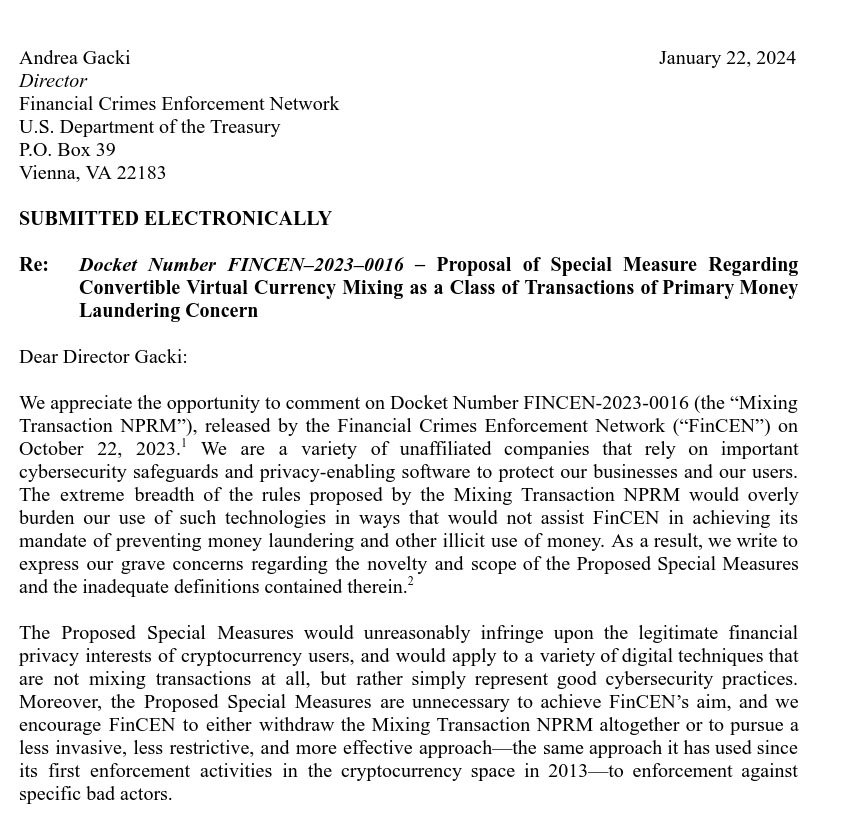In response to FinCEN’s proposed rules threatening Bitcoin privacy, Samourai Wallet, a prominent player in the digital asset space, has issued a comprehensive statement through their legal team led by The Crypto Lawyers’ Rafael Yakobi.

The proposal, signed by 25 unaffiliated Bitcoin companies, seeks to normalize Bitcoin mixing and opposes the bureau’s ideology that deems basic practices, like not reusing addresses, suspicious. Samourai Wallet highlights the serious privacy implications this new ruling could have, and challenges the overreach by the U.S. Department of the Treasury.
The proposed regulation identifies routine practices like “creating and using single-address wallets” and “splitting CVC for transmittal” as potential red flags. In the bitcoin community, it is standard for users to change addresses for each transaction to enhance privacy and security.
Coinbase Exchange, for instance, automatically generates a new address for users after every transaction or fund transfer, preventing third parties from connecting all associated transactions to one entity through a blockchain explorer.
Related reading: FinCEN’s Crackdown on Mixers Could Have Serious Implications: Report
Samourai Wallet Questions the Disparity in FinCEN’s Proposal
Samourai highlights the importance of recognizing the fact that although a minority of users engaging in criminal activities employ the same security measures as regular users, it doesn’t implicate these practices are suspicious.
Interestingly, FinCEN acknowledges that these tools play a legitimate role in enabling crucial cybersecurity measures. Financial institutions are exempt from reporting their own mixing transactions conducted while providing services to the public.
Samourai questions this disparity, which allows financial institutions to implement proper cybersecurity measures for using convertible virtual currency (CVC) while ordinary individuals are subject to the regulatory framework.
Key Issues Raised in the Response
- Broad Regulatory Reach: Samourai challenges the unprecedented breadth of the proposed measures, which could infringe on legitimate financial privacy interests and hinder the use of essential cybersecurity safeguards. This, according to the response, imposes undue burdens on users and financial institutions.
- Section 311 Powers Caution: The response urges FinCEN to exercise caution, as the proposed rules would mark the first use of Section 311 powers against a class of transactions and the first-ever imposition of Special Measure 1.
- Invasive Reporting Requirements: The response questions the necessity of requiring covered financial institutions to perform law enforcement functions, asserting that existing tools can achieve AML goals without unnecessary surveillance. It states:
“FinCEN, DOJ, and law enforcement can achieve FinCEN’s AML goals using existing tools when they have a proper legal basis to employ those tools.” - Inadequate Definitions: Criticism is directed at the lack of clear definitions by the new proposal, particularly concerning “CVC mixing,” which encompasses routine industry practices like lightning transactions, atomic swaps, and privacy features. It states:
“In proposing the Mixing Transaction NPRM, one arm of Treasury is classifying CVC mixing as a transaction type, while another arm of Treasury argues that mixing is a contract for services.”
Samourai Wallet calls for the complete withdrawal of the proposed rules, emphasizing the need for balanced regulation that safeguards privacy while effectively combating illicit activities. The proposal reads:
“The Proposed Special Measures are unnecessary to achieve FinCEN’s aim, and we encourage FinCEN to either withdraw the Mixing Transaction NPRM altogether or to pursue a less invasive, less restrictive, and more effective approach.”
Related reading: “Bitcoin Is In Danger In U.S.” — Warns Hedge Fund Manager Paul Tudor
Yakobi took to X to call FinCEN’s proposed rule an “untenable, unreasonable, unworkable proposition” that seeks to suppress the use of general cybersecurity practices and the proliferation of digital assets at large.
The response reflects the broader industry’s concerns and advocates for a more thoughtful and targeted approach to digital asset regulation.










